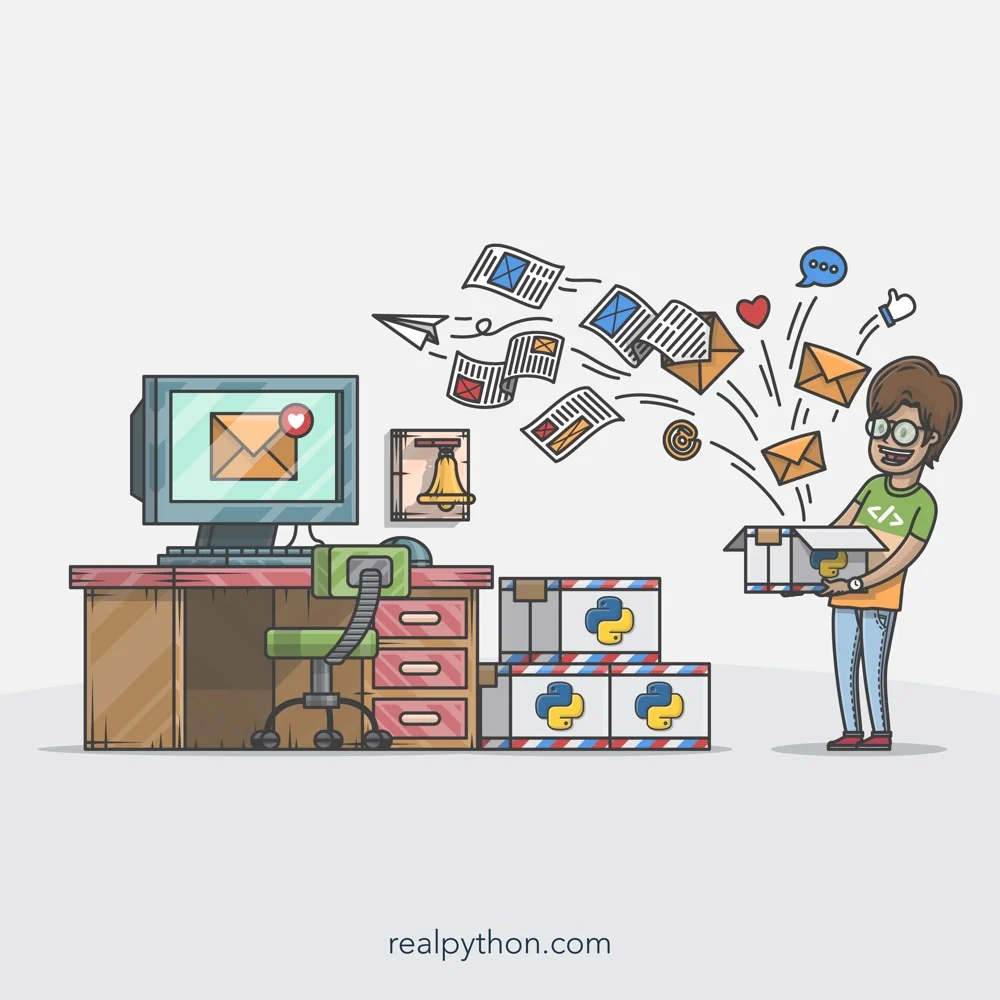Python 3.14 nears release with new features in sight, and Django 6.0 alpha hints at what’s next for the web framework. Several PEPs have landed, including improvements to type annotations and support for the free-threaded Python effort.
Plus, the Python Software Foundation announced new board members, while Real Python dropped a bundle of fresh tutorials and updates. Read on to learn what’s new in the world of Python this month!
Join Now: Click here to join the Real Python Newsletter and you’ll never miss another Python tutorial, course, or news update.
Python 3.14 Reaches Release Candidate 3
Python 3.14.0rc3 was announced in September, bringing the next major version of Python one step closer to final release. This release candidate includes critical bug fixes, final tweaks to new features, and overall stability improvements.
Python 3.14 is expected to introduce new syntax options, enhanced standard-library modules, and performance boosts driven by internal C API changes. For the complete list of changes in Python 3.14, consult the official What’s new in Python 3.14 documentation.
The release also builds upon ongoing work toward making CPython free-threaded, an effort that will eventually allow better use of multicore CPUs. Developers are encouraged to test their projects with the RC to help identify regressions or issues before the official release.
The final release, 3.14.0, is scheduled for October 7. Check out Real Python’s series about the new features you can look forward to in Python 3.14.
Django 6.0 Alpha Released
Django 6.0 alpha 1 is out! This first public preview gives early access to the upcoming features in Django’s next major version. Although not production-ready, the alpha includes significant internal updates and deprecations, setting the stage for future capabilities.
Some of the early changes include enhanced async support, continued cleanup of old APIs, and the groundwork for upcoming improvements in database backend integration. Now is a great time for Django developers to test their apps and provide feedback before Django 6.0 is finalized.
Django 5.2.6, 5.1.12, and 4.2.24 were released separately with important security fixes. If you maintain Django applications, then these updates are strongly recommended.
PEP Highlights
Python continues to evolve and improve through a community-driven process. Proposed changes and improvements are formally documented in Python Enhancement Proposals (PEPs), which serve both as design documents and as a record of the language’s evolution. Here are some highlights from the past month.
PEP 794: Import Name Metadata (Accepted)
PEP 794 introduces two new fields to Python’s packaging metadata, Import-Name and Import-Namespace. These fields allow projects to explicitly declare which import names they provide once installed, addressing the issue where a project’s name doesn’t necessarily match the importable module names. Popular examples include the Pillow library (PIL), beautifulsoup4 (bs4), and scikit-learn (sklearn), to name a few.
This metadata aids tools in identifying what import names a project offers, which is particularly useful for package discovery, avoiding import name conflicts, and enhancing tooling support. The proposal also includes updates to the pyproject.toml file format to accommodate these new fields. By providing this information, PEP 794 aims to improve the reliability and clarity of Python’s import system.
PEP 803: Stable ABI for Free-Threaded Builds (Added)
PEP 803 introduces a significant enhancement to Python’s extension ecosystem by defining a stable application binary interface (ABI) compatible with both free-threaded and Global Interpreter Lock (GIL)-enabled builds. This development is a crucial step toward making free-threaded Python the default, as outlined in PEP 779.
Prior to this PEP, extensions built using the standard API were incompatible with free-threaded builds due to direct access to internal CPython structures. PEP 803 addresses this by making key structures like PyObject, PyVarObject, and PyModuleDef opaque, thereby preventing direct access to their internal fields. This change necessitates the use of new API functions for tasks such as defining modules and classes.
For packaging and distribution, a new wheel tag, abi3.abi3t, has been introduced. This tag indicates that a wheel is compatible with both GIL-enabled and free-threaded builds of Python 3.15 and later. Extensions built with this tag will be forward-compatible with future Python 3.x versions, facilitating easier maintenance and distribution.
This lays the groundwork for a more robust and flexible extension ecosystem by providing a stable ABI that supports both free-threaded and GIL-enabled Python builds. This advancement simplifies the development and distribution of C extensions, paving the way for broader adoption of free-threaded Python in the future.
PEP 782: Add PyBytesWriter C API (Final)
This finalized PEP 782 introduces an internal C API, designed to efficiently construct Python bytes objects incrementally in C code. This new API addresses performance bottlenecks in low-level operations within the standard library, particularly when constructing large or fragmented bytes outputs.
Prior to this enhancement, constructing bytes objects in C often involved using functions that treated immutable bytes objects as mutable. This could lead to potential issues with incomplete or inconsistent objects. These functions also employed inefficient allocation strategies, requiring multiple reallocations that could degrade performance.
The new API addresses these concerns by providing a structured approach to building bytes objects. It allows for over-allocation of memory, reducing the number of reallocations needed, and improving efficiency. By adopting the PyBytesWriter API, developers can achieve better performance and reliability in constructing bytes objects in C, aligning with Python’s principles of immutability and efficiency.
PSF Board Election Results
The Python Software Foundation announced the results of its 2025 board elections. The newly elected board members will help steer the strategic direction of the PSF and allocate resources to support Python’s development, community grants, and outreach efforts:
- Abigail Dogbe
- Jannis Leidel
- Sheena O’Connell
- Simon Willison
The board plays a critical role in responding to the evolving needs of the global Python community. Congratulations to the elected candidates!
“Python for Beginners” Live Cohort Launches This October
Real Python is launching a Python for Beginners live cohort course, starting October 13.
This 8-week intensive program gives you live instruction with real-time feedback from expert Python educators, going beyond what video tutorials and written content can offer. You’ll dive into core Python concepts, like variables, data structures, control flow, functions, and object-oriented programming (OOP). You’ll be working in small group sessions where instructors can catch mistakes as they happen and answer your questions on the spot.
The cohort format means you’ll learn alongside a small group of motivated developers at the same skill level, building real projects together and finishing with working programs for your portfolio.
We developed this program after analyzing thousands of responses from Python beginners about where they get stuck. Every week tackles a specific challenge that new programmers face, with structured progression and hands-on practice designed to build genuine coding ability.
Enrollment is limited, and spots are filling up quickly. The cohort runs for eight weeks, starting October 13:
View the full syllabus and course details →
Whether you’re brand new to programming or have dabbled with Python on your own, this cohort gives you the structure, feedback, and support to take your skills to the next level.
Real Python Roundup
Last month, the Real Python team published a variety of fresh tutorials designed to help you level up your skills. Whether you’re experimenting with new Python features, managing environments, or building APIs, these step-by-step guides provide practical examples and clear explanations.
- Managing Multiple Python Versions With pyenv
- uv vs pip: Managing Python Packages and Dependencies
- How to Drop Null Values in pandas With .dropna()
- What Does -> Mean in Python Function Definitions?
- Python 3.14 Preview: REPL Autocompletion and Highlighting
- Get Started With FastAPI
- Python MCP Server: Connect LLMs to Your Data
- Astral’s ty: A New Blazing-Fast Type Checker for Python
Alongside the written content, Real Python has been rolling out new and updated video courses. These short, focused lessons give you the chance to see Python concepts demonstrated in code and come with transcripts and exercises to reinforce your learning.
If you prefer to learn on the go, don’t miss the latest episodes of the Real Python Podcast. Each week, host Christopher Bailey talks with Python experts and community members about tools, best practices, and the stories behind the code. These episodes complement our tutorials and courses with real-world insights.
Final Notes
October is shaping up to be a big month, with the official release of Python 3.14. Real Python will keep you updated on all the Python 3.14 news and everything else happening in the Python world. See you next month with more Python updates!
Join Now: Click here to join the Real Python Newsletter and you’ll never miss another Python tutorial, course, or news update.







